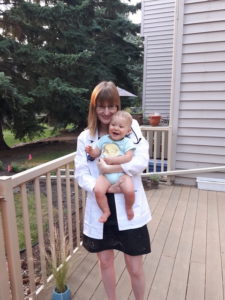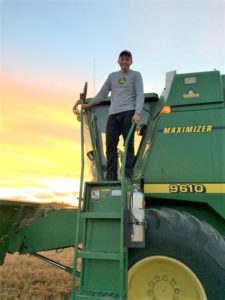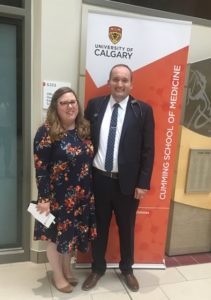Don’t rule out becoming a physician just because you started your undergraduate degree in a subject like agriculture, nursing, or physiotherapy.

That’s the advice of three students who are in various stages of pursuing their medical degrees. They recently shared their journeys into medicine with rural Alberta high school students during the virtual session “Let’s Go Rural – How Do I Get There? Medical School” hosted by RhPAP in collaboration with University of Calgary, Cumming School of Medicine, Department of Distributed Learning and Rural Initiatives.
Vermilion-raised woman juggles raising young son with studies
Chelsea Barlow wanted to become a nurse when she started her schooling at MacEwan University in Edmonton.
Just one year later, the then Vermilion-area resident switched paths, deciding she might be more suited for physiotherapy. She maintained her biology and psychology focus and graduated from the University of Alberta as a physiotherapist.
Barlow worked for a few years alongside physiotherapists and occupational therapists, but she often thought there was more that she could do for her patients.
“I kept looking at people’s charts and [thinking], ‘I want to know more about their diagnoses—more about the medical side of it.’ And then I kept thinking, ‘Oh, geez, if I was the doctor, I could really advocate for this person and make sure their questions are being answered and that they were seeing the right specialists.’”
“I kept having that nagging feeling until I finally decided, ‘I am going to write the MCAT [Medical College Admission test] and apply.’”
Barlow applied and got in on her first try. The same day she was accepted into medical school, she received some other big news—a positive pregnancy test. She put her physician dreams on hold to welcome her son, Louie.
Six months later, Barlow began her medical journey at the University of Calgary while her husband, J.B. Pellerin, cared for their baby.
Her path to medicine has involved many detours, but Barlow has no regrets. Medicine may have been in the back of her mind for years, but the timing wasn’t quite right when she finished high school.
“People always said: ‘You should be a doctor…. For me, I just thought, ‘Oh no, the path would be too hard or maybe I wouldn’t suit that lifestyle.
“I don’t think I had the confidence at the time to really go for it,” said Barlow of her uneasiness as a high school graduate although her marks were well within the parameters necessary for medical school.
When she finally decided a medical path was within reach, Barlow focused on her personality and interests such as her passion for volunteering with animals during the interview process.
“They didn’t want somebody who’s just a cookie cutter applicant. For Calgary, my experience was that it seemed like the school really wanted you to show that you’re kind of unique.”
Spring Coulee resident trades in combine for stethoscope
For Zach Gorham, his medical school story was a case of “mother knows best.”

The Spring Coulee resident didn’t give much thought to becoming a doctor growing up, but his mother did. She believed his empathy, good listening skills, and academic performance aligned well with a career as a physician.
“I was kind of … one of those kids [for whom] I think my mom always had the vision of medical school, but I wasn’t so sure. [She] didn’t push me, pressure me or anything like that, but I think she just saw that it would be a good career choice for me.”
Growing up in the small town about a half hour southwest of Lethbridge, Gorham was fascinated by the agriculture surrounding his community. He spent about seven seasons working for local area grain farmers. This work led him to register in agricultural biotechnology at the University of Lethbridge two years after he finished high school.
Midway through his undergraduate degree, a family member was hospitalized for an extended period with a serious illness. Gorham spent considerable time watching the comings and goings of physicians during his hospital visits.
“That experience really solidified for me an interest and a passion for medicine,” he said. “I was so interested in all of the medical procedures that were being done and just the way that medicine works.”

– Photo supplied by Zach Gorham
Gorham finished his undergraduate biotechnology degree and explored the idea of medical school. He had made sure to keep his options open when he first enrolled at Lethbridge, and took several science classes that could be applicable to medicine later on.
The internet may be inundated with tips on how to get into medical school, but Gorham stresses there’s no formula to make a successful candidate.
“Medical schools these days are looking for well-rounded individuals interested in contributing to their community. Obviously, the academic part of it has to be in place as well, but my advice is don’t try to be the ideal medical school candidate. Try to be the ideal version of who you are.”
Doctors don’t need to be “superhuman”
Hearing her best friend speak about the care her father received as he was dying tugged at Kathryn Sutherland’s heart.
“I remember on that day, I [thought], … ‘that seems like that would be something I would be good at,’” she said of her ability to be compassionate.
Even though she believed she had the right traits, Sutherland wasn’t sure she could actually become a doctor.
“I never really pursued [medicine] until I was in university,” said the former resident of the Evansburg and Entwistle area, about an hour west of Edmonton.
“So many people start other careers, because I think there’s a lot of misperceptions about what you need to be [to be a doctor].… You don’t have to be this superhuman, perfect individual. It’s really about trying, caring, and doing the best you can.”
Achieving good grades is an important part of getting into medical school, but Sutherland maintains it doesn’t mean the learning had to come easy.
“I think that there’s always that stereotype of [doctors] being the person who picks everything up really quickly and [learns] everything at the drop of the hat. I think you can work hard and fail at something the first go round, or not do as well and still [succeed].”
After two years at MacEwan University, Sutherland applied for medical school and was accepted to the University of Calgary’s Cumming School of Medicine the following spring.
“If you looked at me on paper, compared to most applicants, I would appear as an underdog. I don’t have a master’s degree, a PhD, or publications in my name or anything like that. But I think that my strength comes in the interview process and building relationships with people.”
Sutherland looks back and is grateful she invested her time in science-based courses and achieved good grades in high school.
Her focus might be slightly different if she was to do it all over again.
“If I could go back and talk to me in high school, I wouldn’t worry so much about the grade itself, as long as it would get me into university. I think the understanding is so much more important” [than the grades],” she reflected.
High school students sometimes don’t realize how courses such as physics come into play in medicine. Knowing some details on how equipment works for ultrasounds, x-rays, and magnetic resonance imaging (MRIs) can shed some light on test results, noted Sutherland.
“It’s easier to understand how to interpret the test when you understand what the test is doing.”
— Lorena Franchuk
